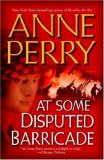Summary | Excerpt | Reviews | Beyond the Book | Readalikes | Genres & Themes | Author Bio

A Novel
by Anne Perry
Joseph passed an officers' dugout, its entrance down steep steps. It was narrow as a tomb, but at least it was safe from sniper fire, and in the winter as warm as anyone could be in the frozen earth. He emerged from the confining walls of the trench into Zoave Wood. Most of the trees here were blasted or burned, but a few still had leaves. Beneath them the earth that normally was covered with undergrowth was trampled flat. The front line passed right through what was left of the wood.
He stood close to the trunk of the nearest tree and felt its rough bark against his back. If Snowy was here in these few acres behind the line it was just a matter of walking quietly, crisscrossing it like a gamekeeper looking for a poacher. Except that Snowy would probably be motionless in his grief, alone, growing cold even in this summer night because he was exhausted not in body but in heart. Perhaps he was consumed by that terrible, inexplicable guilt that survivors feel when for no reason at all they live on after those they loved have died.
Joseph started to walk, placing his feet softly on the bare ground. The wind stirred in the few remaining leaves, and shadows flickered, but he could hear nothing else above the noise of the guns. It was a warm night and the stench of the dead mixed with that of the latrines was thick in his throat, although these days he hardly noticed it. It was there all the time. You had to get right away from the lines, into one of the towns, perhaps in an estaminet, and smell cheese and wine and sweat before you lost it. Fortunately there was opportunity for this in places like Poperinghe or Armentieres and the small villages within a few miles.
Something moved to his right. It must be a soldier. There were no animals left, and even birds would not come this close to the lines. He turned toward the figure and walked zigzag from tree to tree. It was a while before he saw the movement again. It was not Snowy. The man was too tall.
The sky was completely dark now, the only light emanating from gun flashes and star flares. They made the trees black and filled the spaces between with jagged shadows as the rising wind swayed them to and fro. The summer heat could not last. Soon there would be rain, maybe a thunderstorm. It would clear the air.
He almost stumbled on them: five men sitting in a slight hollow, facing each other and talking, all of them dragging on cigarettes, the brief glow marking their positions and momentarily showing a cheek or the outline of a nose and brow. At first he could not hear the words, but at least one of the low, emotion-charged voices was familiar: It was Edgar Morel, one of his own students from Cambridge days.
Joseph dropped down to his hands and knees to be less obvious, and crept forward soundlessly, keeping his movement steady so he didn't catch anyone's eye.
Morel drew on his cigarette again. The burning tobacco glowed red, showing his gaunt features and wide, dark eyes. He was speaking urgently and the anger in him was clear in the rigid lines of his shoulders and chest as he leaned forward. His captain's insignia gleamed for a moment, then the darkness returned and the smoke he blew out was almost invisible. Joseph could smell it more than see it.
"They're going to send us over the top again, toward Passchendaele," Morel said harshly. "Thousands of us--not just us but Canadians, French, and Aussies, too. It's all just as bloody hopeless as it's always been. Jerry'll pick us off by the hundreds. It'll wipe us out. There's almost nothing left of us already."
"They're all barking mad!" Geddes said bitterly. He was a lance corporal with a long, thin face. The hand holding his cigarette was shaking. It could have been nerves, or shell shock.
Somebody else lit another and passed it across. The man who took it thanked him and took a long drag, then coughed. Joseph stiffened, his stomach knotting. It was Snowy Nunn. He could not see the white blond hair under his helmet, but he recognized his voice.
Excerpted from At Some Disputed Barricade by Anne Perry Copyright © 2007 by Anne Perry. Excerpted by permission of Ballantine Books, a division of Random House, Inc. All rights reserved. No part of this excerpt may be reproduced or reprinted without permission in writing from the publisher.
Your guide toexceptional books
BookBrowse seeks out and recommends the best in contemporary fiction and nonfiction—books that not only engage and entertain but also deepen our understanding of ourselves and the world around us.